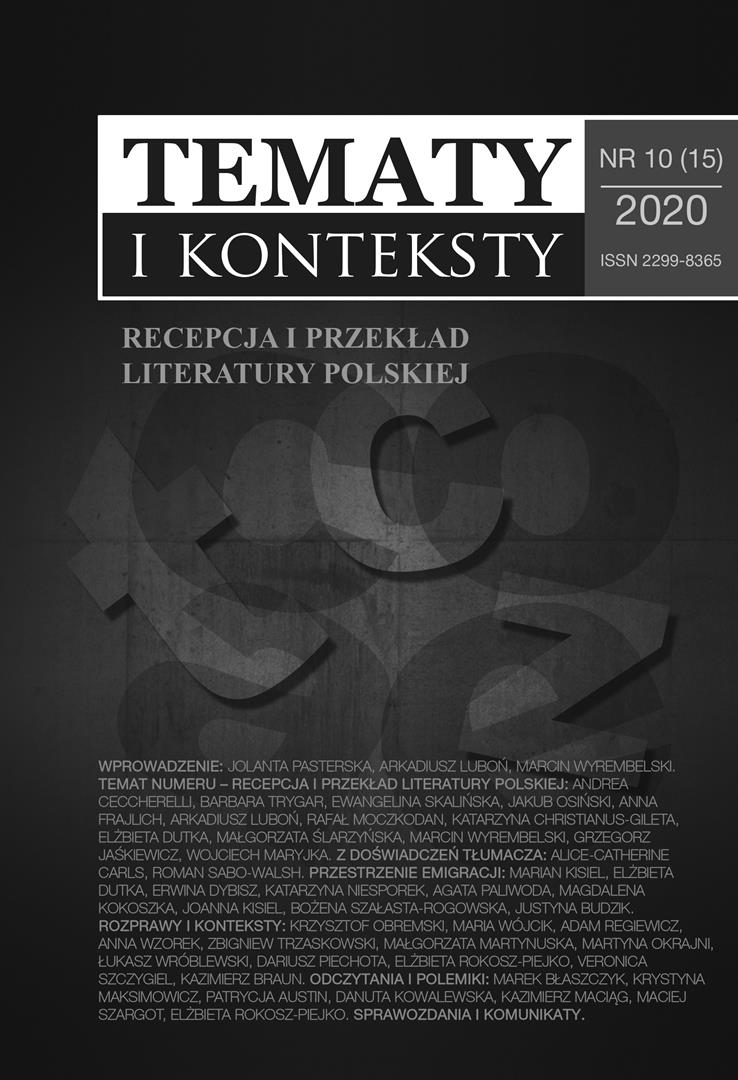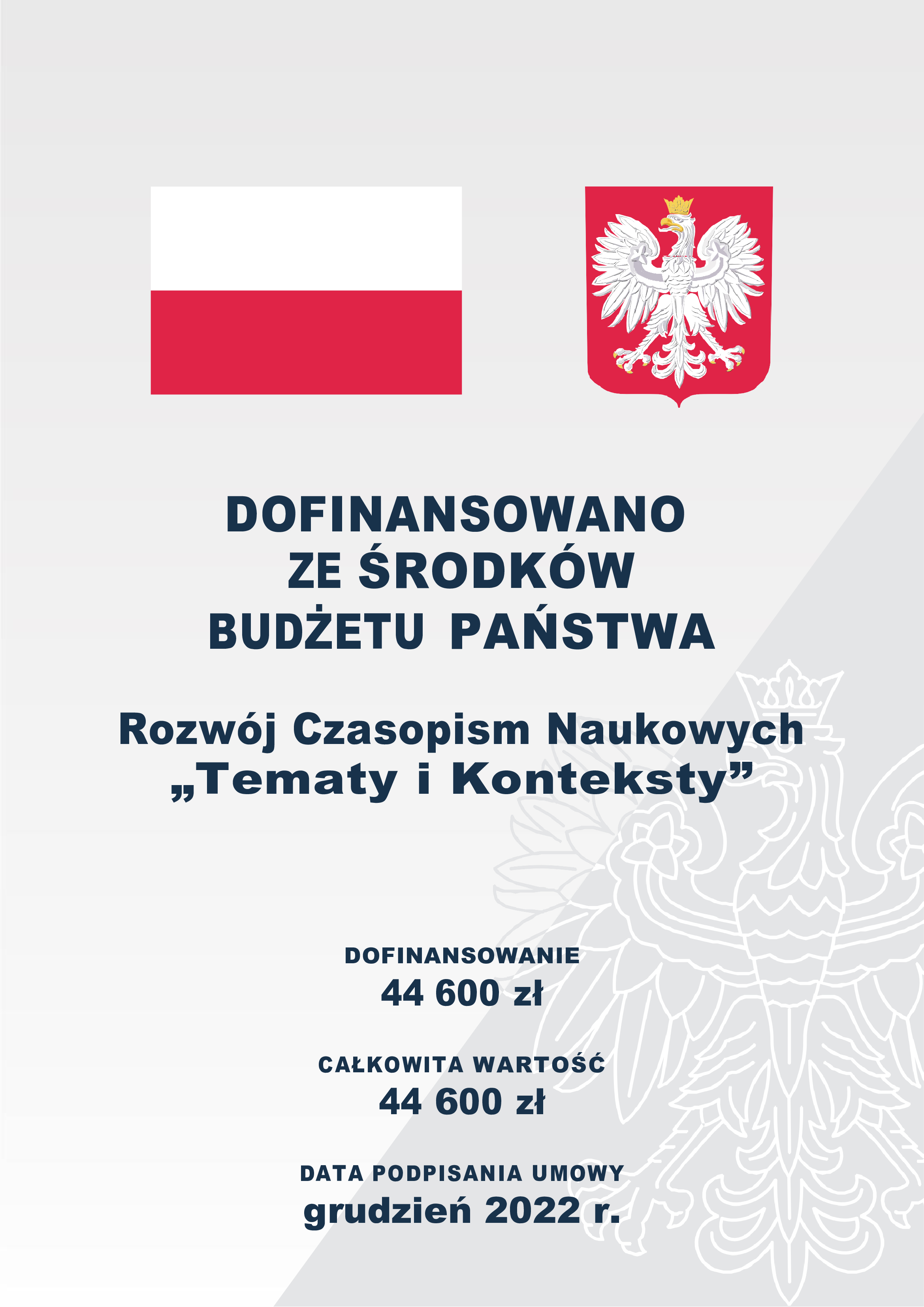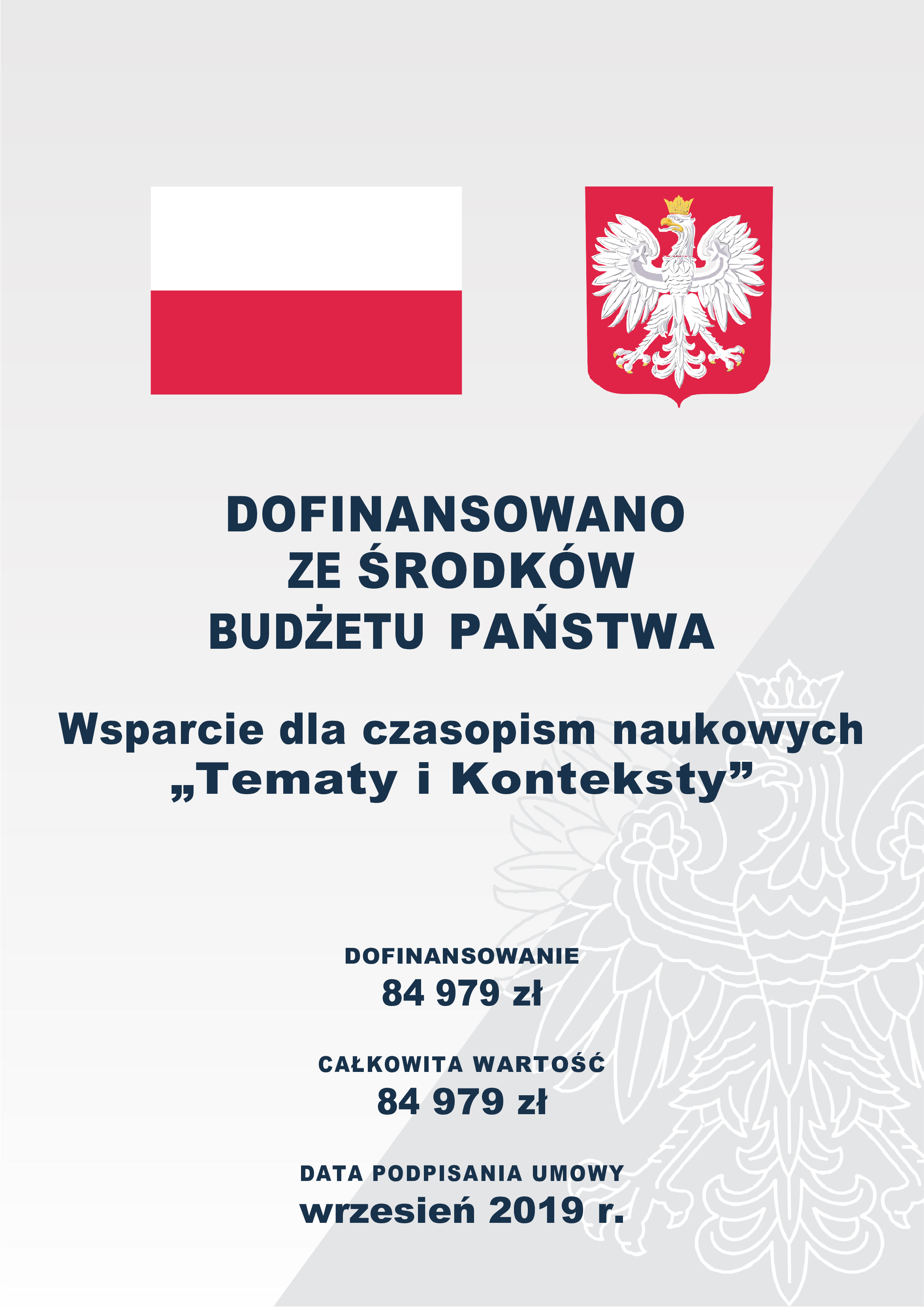Lack of Post-GDR Literature in Polish Cultural Reality. An Attempt Discuss the Issue
Die in Polen ausgeblendete Zone. Hinweise auf die ostdeutsche Wende-Literatur
DOI:
https://doi.org/10.15584/tik.2020.13Keywords:
post-GDR literature, GDR novels, translations, Christa Wolf, Hermann Kant, Thomas Brussig, German literature after 1989, , reception of GDR literature in PolandAbstract
German literature has been present in Polish cultural reality for a long time − although with variable popularity − due to the translations that produced Polish versions available for wider audience, including readers unfamiliar with German language. Yet, the article discusses a branch of German literature still absent in Poland – the so-called Post-GDR Literature, written after the fall of the German Democratic Republic and the German reunification. The Post-GDR Literature addresses a variety of issues related to the GDR, idealizes or critically describesits reality often perceived by writers as the reality of their childhood or youth. The author of the article takes into consideration the fact that on Polish book market after 1989 this literature is almost unavailable despite numerous efforts of translators and publishers and their initiatives aimed at popularization of German literature in Poland. Thus, the article subsequently discusses texts (Was bleibt by Christa Wolf, Der Abspannby Hermann Kant and Heldenwiewir by Thomas Brussig) significant enough to deserve unabridged Polish versions. The three writers represent different genres, aesthetics, generations and level of involvement in political activity. Nonetheless, their works all inspired crucial discussions, attitudes or events and are therefore of vital importance for Polish readers willing to fully understand the reality of Eastern Germany and the impact of its legacy on current times.
Downloads
References
Anz, Th. (Hrsg.), „Es geht nicht um Christa Wolf“: der Literaturstreit im vereinten Deutschland, München, Ed. Spangenberg: 1991.
Bruyn, G. de, Scharfmaul und Prahlhans. „Der Abspann” des Hermann Kant: der ehemalige Präsident des DDR-Schriftstellerverbandes hat seine Erinnerungen geschrieben, Die Zeit, 20.09.1991.
Buras, Jacek St., Ambitna literatura autorów niemieckojęzycznych w Polsce, [in] M. Wolting/ S. Wolting (Hrsg.), Zrozumieć obcość.Recepcja literatury niemieckojęzycznej w Polsce po roku 1989, Kraków, TAiWPN Universitas: 2016, S. 19–30.
Corino, K. (Hrsg.), Die Akte Kant. IM „Martin“, die Stasi und die Literatur in Ost und West. Reinbek bei Hamburg, Rowohlt Taschenbuch: 1995.
Deiritz, K., Krauss, H. (Hrsg.), Der deutsch-deutsche Literaturstreit oder „Freunde, es spricht sich schlecht mit gebundener Zunge“: Analysen und Materialien, Hamburg, Zürich, Luchterhand: 1991.
Grub, F. Th., ›Wende‹ und ›Einheit‹ im Spiegel der deutschsprachigen Literatur: Ein Handbuch, Band 1, Untersuchungen, Berlin, New York, Walter de Gruyter: 2003.
Jaśkiewicz G., Thomas Brussigs „Helden wie wir” oder die Wende mal anders gesehen, [in] Studia Germanica Resoviensia 2007, Nr. 5, S. 110–116.
Jaśkiewicz, G., DDR und Erinnerungsstrategien ostdeutscher Autoren und Autorinnen in literarischen Texten nach 1990, [in] M. Wierzbicka/ G. Jaśkiewicz (Hrsg.), Germanistische Kontexte, Rzeszów, Wydawnictwo Uniwersytetu Rzeszowskiego: 2017, S. 136–148.
Kopacki A., Bilans dwudziestu pięciu lat: „Całkiem niezłe ćwierćwiecze”, [in] M. Wolting/S. Wolting (Hrsg.), Zrozumieć obcość. Recepcja literatury niemieckojęzycznej w Polsce po roku 1989, Kraków, TAiWPN Universitas: 2016, S. 13–18.
Lasowy-Pudło, M., Recepcja literatury NRD w Polsce w latach 1949–1990, Wrocław, Oficyna Wydawnicza Atut – Wrocławskie Wydawnictwo Oświatowe: 2010.
Moros-Pałys, Z., (N)ostalgiczny niemiecki pisarz czy ironiczny krytyk czasów NRD – recepcja „Słonecznej Alei“ Thomasa Brussiga w Polsce, [in] M. Wolting/ S. Wolting (Hrsg.), Zrozumieć obcość. Recepcja literatury niemieckojęzycznej w Polsce po roku 1989,Kraków, TAiWPN Universitas: 2016, S. 331–352.
Skop M., Bibliografie zur Rezeption von Christa Wolfs Werken in Polen, [in] J. Ławnikowska-Koper (Hrsg.), Christa Wolfs Œuvre. Rückblick, Einblick, Ausblick, Częstochowa, Wydawnictwo im. Stanisława Podobińskiego Akademii im. Jana Długosza: 2013, S. 165–188.
Światłowski, Z., Kant Hermann, [in] M. Zybura (Hrsg.), Pisarze niemieckojęzyczni XX wieku. Leksykon encyklopedycznyPWN, Warszawa – Wrocław, Wydawnictwo Naukowe PWN: 1996, S. 164.
Vinke, H. (Hrsg.), Akteneinsicht Christa Wolf. Zerrspiegel und Dialog. Eine Dokumentation, Hamburg, Luchterhand Literaturverlag: 1993.
Wolting M., „Wszystko, co przemija, jest tylko alegorią“. Pół wieku recepcji twórczości Christy Wolf, [in] M. Wolting/ S. Wolting (Hrsg.), Zrozumieć obcość. Recepcja literatury niemieckojęzycznej w Polsce po roku 1989, Kraków, TAiWPN Universitas: 2016, S. 43–58.
Wolting M., Wolting S., Zrozumieć to, co obce, i poznać to, co własne. Słowo wstępne, [in] M. Wolting/ S. Wolting (Hrsg.), Zrozumieć obcość. Recepcja literatury niemieckojęzycznej w Polsce po roku 1989, Kraków, TAiWPN Universitas, S. 7–12.
Downloads
Published
How to Cite
Issue
Section
License
Copyright (c) 2020 Tematy i Konteksty

This work is licensed under a Creative Commons Attribution-NonCommercial-NoDerivatives 4.0 International License.




